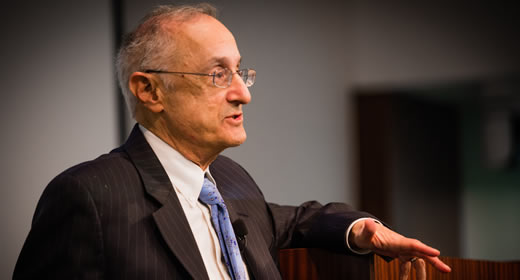
This fall, the Ford School added six governing faculty members and two policymakers-in-residence while welcoming home three faculty members who had been on leave for high-profile policy service in Washington, DC. These new and returning faculty members will teach a number of electives this winter in population health policy, public sector economics, the psychology of environmental economics, and other topics.
Elective courses by new governing faculty
Population health policy will be offered by Paula Lantz, the Ford School’s new associate dean for faculty research and policy engagement, whose work focuses on social inequalities in health, the role of public health in health care reform, and clinical preventive services such as cancer screening and prenatal care.
Macroeconomics will be taught by John Leahy, the Allen Sinai Professor for Economic Policy, whose work focuses on the roles that market frictions and imperfect information play in shaping economic outcomes.
Child and family policy will be offered by Natasha Pilkauskas, a new assistant professor whose research focuses on the health, development, and well-being of low-income families and children.
Environmental psychology for public policy will be taught by Kaitlin Raimi, a social psychologist who explores how social motivations can promote or prevent sustainable behaviors.
Philanthropic foundations of the public arena will be taught by Megan Tompkins-Stange, whose research and teaching interests center on the impact of private sector and philanthropic actors in the public arena—particularly in the field of public education.
Elective courses by returning faculty experts
Social policymaking through the executive branch will be offered by Betsey Stevenson, who is returning to the Ford School following extended service as a member of President Obama’s Council of Economic Advisers.
Cyber conflict will be taught by Bob Axelrod, who is returning to the Ford School following a year-long Jefferson Science Fellowship working on Secretary John Kerry’s Shared Prosperity Agenda at the U.S. Department of State.
Elective courses by visiting policymakers-in-residence
Running, serving, and leading, a course that offers students a practical understanding of what it takes to attain elected office, will be taught by Gretchen Whitmer, former Michigan Senate Democratic Leader and the first woman to lead a caucus in Michigan’s history.
Survey of U.S. foreign policy in 12 episodes and Diplomacy and economic influence will be taught by Richard Boucher, former deputy secretary-general of the Organisation for Economic Cooperation and Development and the longest-serving assistant secretary of state for public affairs in U.S. State Department history.